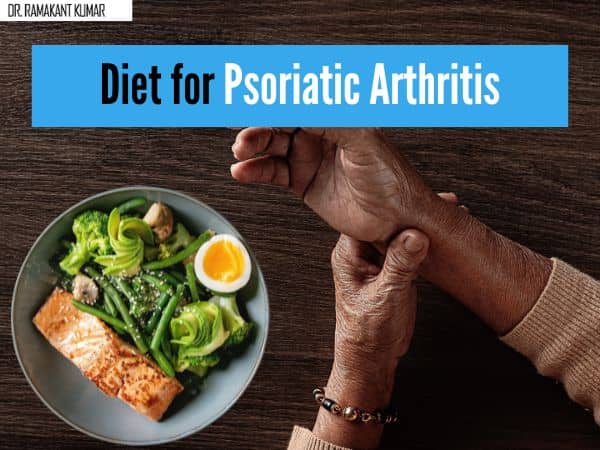Psoriatic arthritis is referred to as a chronic autoimmune disease that affects the joints and the skin.
The disease can cause joint pain, stiffness, and swelling, as well as skin lesions and nail abnormalities.
While there is no known cure for Psoriatic Arthritis Lifestyle Changes, including changes in diet, can help manage the symptoms and improve overall health.
Eating a nutritious and balanced diet can help reduce inflammation, support joint health, and promote overall well-being.
In this context, understanding the importance of a healthy diet for psoriatic arthritis can be crucial for managing the symptoms of the condition.
Contents
Is There A Diet For Psoriatic Arthritis?
Diet plays an essential role in managing psoriatic arthritis. Here is the list of benefits that you get after following a Diet for Psoriatic Arthritis.
#1. Reduce inflammation: Psoriatic arthritis is an inflammatory disease, and some foods can exacerbate inflammation in the body. On the other hand, some foods can reduce inflammation.
Eating a diet rich in fruits, vegetables, whole grains, and healthy fats, such as omega-3 fatty acids, can help reduce inflammation.
#2. Maintain a healthy weight: Being overweight or obese can put extra stress on the joints, which can worsen psoriatic arthritis symptoms. Eating a balanced diet and maintaining a healthy weight can help reduce joint pain and improve mobility.
#3. Improve gut health: The gut microbiome plays an essential role in the immune system and can affect the severity of psoriatic arthritis. Eating a diet rich in fiber and fermented foods can help improve gut health and reduce inflammation.
#4. Avoid trigger foods: Some people with psoriatic arthritis may have trigger foods that can exacerbate symptoms.
These trigger foods can vary from person to person, but common trigger foods include processed foods, sugary foods, and alcohol. Identifying and avoiding trigger foods can help manage symptoms.
Psoriatic arthritis is a type of arthritis that causes joint pain, stiffness, and swelling, as well as skin problems like psoriasis.
To get an effective treatment for arthritis you must go for the Best Doctor in Patna for Orthopedic to get it cured as soon as possible.
While there is no specific Autoimmune Protocol Diet for Psoriatic Arthritis that has been proven. However here are some foods that may help to reduce inflammation and improve symptoms.
You must also read about the benefits of chiropractic in hip arthritis.
Foods to Include in Diet for Psoriatic Arthritis
Here are some foods that you may want to include in your Healthy Psoriatic Arthritis Diet:
Omega-3 fatty acids: Found in fatty fish like salmon, tuna, and sardines, as well as in walnuts and flaxseed, omega-3 fatty acids have anti-inflammatory properties that may help to reduce joint pain and stiffness.
Colorful fruits and vegetables: Fruits and vegetables that are rich in antioxidants, such as blueberries, strawberries, cherries, spinach, and kale, may help to reduce inflammation and protect against damage caused by free radicals.
Whole grains: Whole grains like brown rice, quinoa, and whole-wheat bread are rich in fiber, which can help to reduce inflammation and promote healthy digestion.
Lean protein: Chicken, turkey, and fish are good sources of lean protein, which is important for maintaining muscle mass and promoting healthy joints.
Spices and herbs: Certain spices and herbs like turmeric, ginger, and garlic have anti-inflammatory properties that may help to reduce joint pain and stiffness.
It’s important to note that while these foods may be helpful in managing psoriatic arthritis symptoms, there is no one-size-fits-all diet that will work for everyone.
It’s always a good idea to talk to your doctor or a registered dietitian to develop a personalized nutrition plan that is right for you.
Many nutritionists these days provide a quick ebook guide like Psoriatic Arthritis Diet Recipes so you can take help from them while planning a Diet for Psoriatic Arthritis.
Foods to Avoid in Diet for Psoriatic Arthritis
Here are some foods that you may want to avoid or limit if you have Psoriatic Arthritis:
Processed foods: Processed foods, such as chips, packaged snacks, and frozen dinners, contain high amounts of trans fats, sugar, and salt. These ingredients can trigger inflammation in the body and worsen the symptoms of Psoriatic Arthritis.
Red meat: Red meat is high in saturated fats, which can trigger inflammation. Try to limit your consumption of red meat and opt for lean proteins such as chicken, fish, or plant-based proteins.
Dairy products: Dairy products contain a protein called casein, which can trigger inflammation. Some people with Psoriatic Arthritis find that eliminating dairy products from their diet can reduce inflammation and improve symptoms.
Gluten: Some people with Psoriatic Arthritis have gluten intolerance, which can trigger inflammation. Avoiding gluten-containing foods, such as bread, pasta, and baked goods, may help reduce inflammation.
Nightshade vegetables: Some people with Psoriatic Arthritis find that nightshade vegetables, such as tomatoes, potatoes, and eggplant, can trigger inflammation and worsen symptoms.
So your most frequently asked question of whether are tomatoes bad for psoriatic arthritis can be concluded on the basis that some people with psoriatic arthritis may have individual food sensitivities or allergies that can trigger flare-ups.
However, this is not the case for everyone, so it’s best to experiment with your diet to see what works best for you.
It’s important to note that there is no one-size-fits-all approach to diet and Psoriatic Arthritis. Consult with a healthcare professional or a registered dietitian to discuss a diet plan that is tailored to your specific needs and goals.
And for the best treatment of Psoriatic Arthritis, you can get an appointment with Dr. Ramakant Kumar – the best doctor for Shoulder Arthroscopy Patna.
Diet for Psoriatic Arthritis – Concluding Thoughts
In conclusion, maintaining a healthy and balanced diet plays an important role in managing the symptoms of psoriatic arthritis. While no specific diet can cure the condition, avoiding inflammatory foods and including anti-inflammatory options may help reduce inflammation and support overall health.
It is advisable to consult a healthcare professional or the best orthopedic doctor in Patna to create a personalized management plan that may include dietary guidance, lifestyle modifications, and appropriate medical treatment. Staying hydrated and maintaining a healthy weight further aid symptom control.
With the right dietary changes, expert guidance, and a proactive lifestyle approach, individuals with psoriatic arthritis can improve their quality of life and reduce the impact of symptoms over time.




